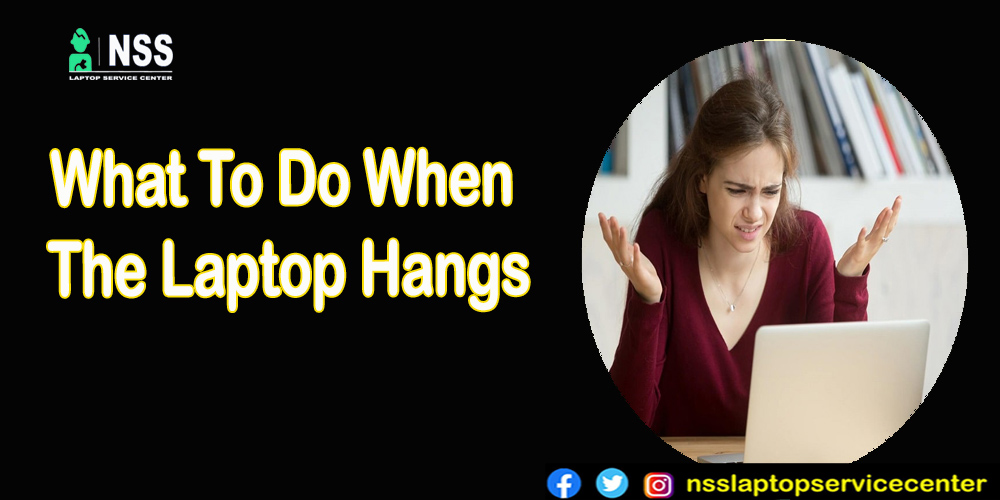
Are you also worried about your laptop system? Is your laptop hanging? Do you have to know what to do when your computer turns? If Not, you can read this article carefully to resolve the laptop hanging problem. Suppose your computer begins to hang while starting or slow down while you are in the middle of anything essential. In that case, it may be highly disruptive to your performance and image, especially if you are in a necessary appointment or completing crucial work. However, it does not mean it is time to get a new laptop. It indicates that your computer requires some care. In the article below, we will explain the most typical reasons why laptops hang or freeze and how to solve laptop hanging problems in Windows 10.
Common ways to do when a Laptop is hanging
Close any unwanted apps or services that are operating in the background.
Install the most recent Windows updates.
To avoid overheating in your laptop, use a cooling pad.
Upgrade RAM for better multitasking performance, reapply thermal paste
A faulty hard drive may also be slowing down your laptop.
Steps That Should Be Followed WHEN THE LAPTOP HANGS
There are various methods through which you can tackle this problem of hanging. Follow these methods or steps to avoid sagging the laptop.
1. Reboot or Restart Your Laptop
They restart if an HP laptop Hangs is usually the most Common Way To Unhang The Laptop. This allows your system to reset and begin again.
Holding down the power button for a few seconds is the best technique to restart a hanging laptop. This allows your computer to resume securely without being disrupted by a catastrophic power outage. Also, disconnect any headphones or additional cords, which might create errors when your computer restarts. If your laptop hangs while starting up again, it's time to look into other possible solutions.
Restart and rebooting are recommended to make your laptop speed faster if any temporary hang glitches occur. It will set up or refresh the laptop system again to increase the laptop's work efficiency.
2. Remove or uninstall the extra apps and software -
This is the first thing you should attempt if your laptop screen hangs. We all are aware of this trick. The Windows Task Manager window will appear when you simultaneously press the Ctrl + Alt + Delete keys on your laptop's keyboard. Recognize which apps or services are using the most CPU and RAM resources. If you locate unwanted software that consumes many laptop resources, select and then choose the 'End Task' button.
Many apps and software on your laptop or PC are useless. They only take up a lot of space on the memory card on the computer, which is one of the reasons for the slower performance and hanging of the laptop. That's why removing these unnecessary apps and software applications from laptops is essential, providing faster speed and avoiding hanging.
To delete or uninstall these unused applications or apps, follow these steps-:
1. Turn on your laptop or PC.
2. Refresh the main window page.
3. Check out all your laptop's unused apps and software.
4. Make a list of them or tick them to uninstall.
5. Select them individually and delete them by clicking the right edges on your laptop.
6. selected unused applications will get uninstalled from your device, increasing your laptop's memory space and reducing the chance of hanging.
This is how you can easily handle and resolve this problem at a level.
3. Provide a limit to apps
Many apps run within excessive limits and take up a lot of memory space in the laptop, leading to slower performance and hanging of the laptop system.
To provide apps to run within restricted limits, follow these steps-:
1. Go to the "task manager" tool option on a Windows 10 laptop.
2. You can also press Ctrl+Shift+Esc on the laptop's keyboard to access the task manager option directly on the window panel.
3. A tab opens on your laptop display screen to all your laptop's software and apps.
4. To run less used software or apps within a limit, click on the laptop's right edge and check the application's details.
5. Select the "change limit "option to change the limit of less usable apps on your laptop.
6. After changing the limit, refresh your laptop.
Once all the undesirable apps and background processes have been discovered and stopped functioning, your problem should be resolved, and the laptop should resume regular operation. If that also doesn't work, it's time to aggressively shut down your computer by holding the 'Power' button for a few seconds before restarting it. Don't forget to save the document you're working on to avoid losing important information.
4. Install the most recent Windows updates.
If you do not install operating system updates on time, your laptop may stop working correctly. It is best to run a legal edition of Microsoft Windows to get regular updates as they are available.
How to Download and Install an Operating System Update in Windows 10
-Navigate to the Settings app.
-Select Update & Security.
-Select Windows Update.
-Then, Select the Check for updates option for required updates.
-Download the update to your device,
-Now select the Restart Now option.
5. RAM
Insufficient RAM might potentially be the cause of your laptop's frequent freezing. Enough RAM is required to keep the system working smoothly. This ensures that all of the applications you run at the same time may remain in RAM at the same time.
Suppose you simultaneously use heavy programs (such as Adobe Photoshop, Adobe Premiere, AutoCAD, or Visual Studio) or open many heavy files. In that case, your laptop may hang if it doesn't have enough RAM to load all those apps or files. You may need to switch to a computer with greater RAM or update your current laptop to add more RAM (provided it supports RAM upgrades).
One of the easiest ways to unhang your laptop is to recognize whether your computer has a RAM problem when switching it on. Everything works great. Still, after a few hours, the computer begins to slow down, files take too long to open, and websites fail to load quickly. It may be because of a lack of RAM storage. Aside from that, if your laptop is continually restarting, this is a strong symptom of defective RAM.
If your laptop's memory space is less, it automatically leads to hanging. So, choose your laptop RAM wisely. Here are some steps that you can follow to keep the RAM up-to-date.
Virus, cache files, and junk
Install antivirus apps and transparent cache files and junk from the laptop to avoid the problem of hanging.
Note-:
•Windows Defender security scan is one of the best app options to protect your laptop from viruses, malware, or spyware.
- Clear web browser history and cache files
You have to clean the browser history and cache files to restore more space to your laptop and avoid the problem of hanging.
6. A faulty hard drive may also be slowing down your laptop.
SSDs are standard in most mid-range and high-end laptops (Solid State Drives). However, HDDs are still used in older computers and newer entry-level laptops (Hard Disk Drives). If your laptop has a hard disc drive and you hear a strange clicking sound every time you switch it on, it indicates something is wrong with the hard disc drive. Take this very seriously! You may lose vital data due to complex disc drive malfunction if there is a significant problem with the hard drive and it crashes. We recommend storing your crucial papers and data on an external hard drive to avoid losing important files. It's an excellent habit to get into before it's too late.
To ensure that the hard disc has indeed failed, launch File Explorer on your laptop and do the following steps:
-Search for File Explorer by clicking the Windows button in the bottom left corner.
-Press the right-click button on the drive you wish to examine and select Properties.
-Navigate to Properties. Then, go to the Tools menu and choose Check. If the hard disc is the source of the problem, you can discover it here.
-You may also use SpeedFan to check for potentially challenging disc problems. You must contact the brand's authorized service center to replace the hard disc if it fails.
7. To Avoid Laptop Overheating, Use A Cooling Pad.
When your laptop hangs up, it indicates that its processors do not operate at ideal clock rates, which may occur when the computer warms up; the CPU must reduce its clock speed to maintain safe operating temperatures. This is known as performance throttling. When a laptop overheats, its fans kick into high gear, and you may notice abnormally loud sounds produced by the cooling fan within the laptop. This indicates that your computer is overheated.
To prevent performance throttling, ensure that your laptop adequately drains heat created within its internals. Furthermore, you must ensure that dust does not block exhausts and air vents from which the computer pumps hot air. Blocked-up air vents can be a significant issue. Using a cooling pad is the best approach to avoid laptop overheating. Laptop coolers are designed to give extra cooling. Fans within the laptop cooling pad draw hot air from its air vents and expel it outdoors. This allows the computer to keep cool. Also, always place the laptop on a firm or flat surface to allow hot air to escape readily. Uneven and soft surfaces, such as a blanket, pillow, or your lap, block the airflow to the laptop. Sometimes, the laptop's CPU cannot adequately disperse heat because the thermal paste (known as thermal compound) has worn away.
If the thermal paste has worn away, take your laptop to an authorized or reputable laptop service engineer and have them reapply for a high-quality thermal paste.
8. Service Centre
If the above methods do not solve the hanging problem, the problem is much more severe than you think. Take your laptop to a service center to resolve the dependent issue permanently.
Why Does Your Laptop Hang?
Every laptop is used uniquely and challenged differently, ecologically or technologically. Every failure is distinct in some way. You can only make the best approximation without an expert looking at the precise situation. A freeze is a general sign of failure, whether the cause is hardware (such as inadequate memory) or malware.
1. Failure of the Operating System
If your laptop passes the Power-On Self-Test (POST) but then stops on a black screen, you may have an issue with your operating system; the system files may have been corrupted due to malware or human mistakes. During startup, you can try to access your laptop's system partition, which will allow you to fix and reinstall your system. How this works depends on your laptop maker; on some machines, you hit the "Del" key at a specified phase of setup, while others use F10 or F2.
2. Hardware Issue
Freezing on startup might indicate that your hardware is failing. Problems with your hard drive will corrupt your data and prevent your operating system from launching. RAM is a typical source of boot issues; like your hard disc, RAM may be damaged by malware or just malfunction with age. Memory diagnostic tools may be used to test your RAM. An overheating motherboard, an inadequate power supply, or even a faulty CPU can all cause freezing. To identify faulty hardware, you may need to get the laptop examined by a specialist.
Conclusion:
Take care of your laptop like you would your friends and family. Always clean them and take measures while using detachable devices from unknown sources.
A list of authorized laptop service centers in India brand-wise is given here.
MSI Laptop Service Centers Near Me
MacBook Service Centers Near Me
Microsoft Service Centers Near Me
Lenovo Service Centers Near Me
Frequently Asked Questions
Popular Services
- MacBook Battery Replacement Cost
- HP Printer Repair in Delhi NCR
- Dell Laptop Repair
- HP Laptop Repair
- Samsung Laptop Repair
- Lenovo Laptop Repair
- MacBook Repair
- Acer Laptop Repair
- Sony Vaio Laptop Repair
- Microsoft Surface Repair
- Asus Laptop Repair
- MSI Laptop Repair
- Fujitsu Laptop Repair
- Toshiba Laptop Repair
- HP Printer Repair Pune
- Microsoft Surface Battery Replacement
- Microsoft Surface Screen Replacement




